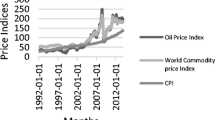Abstract
Since 1975 the leaders of the seven industrial countries (the G-7) have held annual summits to discuss issues of common interest, attempt to coordinate their economic policies, and set goals for their economies. To empirically assess the effects of summit announcements and the degree of compliance with the stated goals on macroeconomic variables is an important, interesting, and well-defined undertaking. The present paper uses fuzzy membership function to model the degree of compliance with the stated goals and a VAR framework to test for the summit effects.
Similar content being viewed by others
References
Bryant, Ralph, Henderson, Dale, Holtman, Gerald, Hooper, Peter and Symansky, Steven (eds.) (1988) Empirical Macroeconomics for Interdependent Economies, Brookings Institution, Washington, D.C.
Canzoneri, Matthew and Gray, JoAnna (1985) 'Monetary Policy Games and The Consequences of Non-Cooperative Behavior', International Economic Review 26, 547-64.
Canzoneri, Matthew and Rogers, Carol Ann (1990) 'Is the European Community an Optimal Currency Area? Optimal Tax Smoothing Versus the Cost of Multiple Currencies', American Economic Review 80, 419-433.
Carlozzi, Nicholas and Taylor, John (1985) 'International Capital Mobility and the Coordination of Monetary Rules', in J. Bhandari (ed.), Exchange Rate Management under Uncertainty, MIT Press, Cambridge.
Chang, Roberto, (1993) 'Financial Integration with and without International Policy Coordination', working paper 93-13, Federal Reserve Bank of Atlanta, October.
Cooper, Richard N. (1969) 'Macroeconomic Policy Adjustment in Interdependent Economies, Quarterly Journal of Economics, 83, 1-24.
Currie, David, Holtham, Gerald and Hallet, Andrew Hughes (1989) 'The Theory and Practice of International Policy Coordination: Does It Pay?' in Bryant et al. (eds.), pp. 1-46.
Dadkhah, Kamran M. and Baliamoune, Mina (1994) 'Computation and Use of Fuzzy Membership function in Econometric Analysis', Department of Economics, Northeastern University, April.
Daniels, Joseph P. (1993) 'The Meaning and Reliability of Economic Summit Undertakings, 1975-1989', in Stuart Bruchey (ed.), Foreign Economic Policy of the United States, Outstanding Studies and Dissertations, Garland Publishing, Inc., New York.
Feldstein, Martin (1983) 'The World Economy', The Economist, June 11.
Feldstein, Martin (ed.) (1988) International Economic Cooperation, University of Chicago Press.
Fischer, Stanley (1987) 'International Macroeconomic Policy Coordination', NBER Working Paper no. 2244.
Frankel, Jeffrey, and Rockett, Katharine (1988) 'International Macroeconomic Policy Coordination When Policymakers Do Not Agree on the True Model',' American Economic Review 78(3), 318-340.
Hajnal, Peter I. (1989) The Seven-Power Summit: Documents from the Summits of Industrialized Countries, 1975-89. Kraus International Publications, New York.
Hamada, Koichi (1976) 'A Strategic Analysis of Monetary Interdependence', Journal of Political Economy 84, 77-99.
Hamilton, James (1994) Time Series Analysis, Princeton University Press, Princeton, NJ.
Hickman, B.G. and Schleicher, S. (1978) 'The Interdependence of National Economies and the Synchronization of Economic Fluctuations: Evidence from the Link Project', Weltwirtschaftliches Archiv 114, 642-708.
Horne, Jocelyn and Masson, Paul (1988) 'Scope and Limits of International Economic Cooperation and Policy Coordination', IMF Staff Papers, 35(3), 259-296, Washington: International Monetary Fund.
MacKinnon, James G. (1991) 'Critical Values for Cointegration Tests', in R.F. Engle and C.W.J. Granger (eds.), Long-Run Economic Relationships: Readings in Cointegration, Oxford University Press.
McKibbin, Warwick and Sachs, Jeffrey (1991) Global Linkages: Macroeconomic Interdependence and Cooperation in the World Economy, The Brookings Institution.
Miller, Marcus and Salmon, Mark (1985) 'Policy Coordination and Dynamic Games', in Buiter and Marston (eds.), 184-227.
Mundell, Robert A. (1971) Monetary Theory: Inflation, Interest, and Growth in the World Economy, Goodyear Publishing Co.
Oudiz, Gilles and Sachs, Jeffrey (1984) 'Macroeconomic Policy Coordination Among the Industrialized Economies', Brookings Papers on Economic Activity 1, 1-64.
Oudiz, Gilles and Sachs, Jeffrey (1985) 'International Policy Coordination in Dynamic Macroeconomic Models', in Buiter and Marston (eds.).
Putnam, Robert D. and Henning, C. Randall (1989) 'The Bonn Summit 1978: A Case Study in Coordination', in Cooper et al. (eds.), Can Nations Agree? Issues in International Economic Cooperation, The Brookings Institution, Washington, D.C.
Sims, Christopher A. (1980) 'Macroeconomics and Reality', Econometrica 48, 1-48.
Von Furstenberg, George M., and Daniels, Joseph P. (1991) Policy Undertakings by the Seven Summit Countries: Ascertaining the Degree of Compliance, Carnegie-Rochester Conference Series on Public Policy, 35, 267-308
Zimmermann H.J. (1987) Fuzzy Sets, Decision Making, and Expert Systems Boston, Kluwer Academic Publishers.
Author information
Authors and Affiliations
Rights and permissions
About this article
Cite this article
Baliamoune, M.N. Economics of Summitry: An Empirical Assessment of the Economic Effects of Summits. Empirica 27, 295–319 (2000). https://doi.org/10.1023/A:1007168602430
Issue Date:
DOI: https://doi.org/10.1023/A:1007168602430




